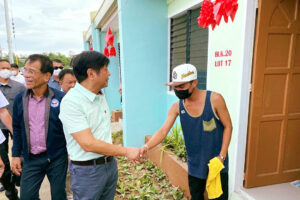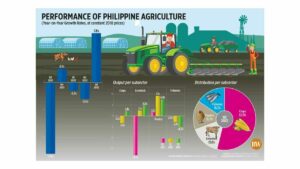The Catholic Bishops should speak out

addressed his supporters during the UNITEAM rally in Koronadal City, South Cotabato on March 27. — PHILIPPINE STAR/KRIZ JOHN ROSALES
In 1995, just four years after he returned from his exile in Hawaii, Bongbong Marcos ran for senator. That was the first time he ran for a national position. The veterans of the People Power uprising in 1986 waged a vigorous campaign against his election to the Senate.
He garnered 8,168,788 votes or 31.7% of the votes cast that year. He fell short by 531,492 votes to land one of the 12 Senate seats to be filled up. There were 15 other candidates who got more votes than him.
He retreated to Ilocos Norte, home province of the Marcoses. There he ran for and was elected governor of the province in 1998. He was re-elected twice. Having reached his term limit, he ran for and was elected representative of the 2nd District of the province in 2007.
Considering himself ripe for the Upper House of Congress in 2010, he ran again for senator. By then, many of those who joined or supported the People Power uprising in 1986 had passed on. Also, people who were too young to know what life was like during Marcos’ military rule and those born in the 1990s had become voters.
No aggressive anti-Bongbong campaign was waged. The remnants of the anti-Marcos forces that foiled Bongbong’s previous senatorial bid devoted their time and effort to Noynoy Aquino’s campaign for the presidency. Thus, Bongbong got 13,169,634 votes or 34.5%, good enough to win him a Senate seat.
In the Senate he gained the reputation of being among the laziest members. He was absent 67 times. He was also among the senators who were frequently late. Of the bills he filed, only one was enacted into law. It was the insignificant law that sought the postponement of the 2013 Sangguniang Kabataan elections.
Just the same, he felt he had become vice-presidential timber in 2016. So, he launched his candidacy for the vice-presidency. The Liberal Party put up the unpretentious representative of the 3rd District of Camarines Sur, Leni Robredo, as its vice-presidential candidate.
Leni bested Bongbong. She garnered 14,418,817 votes or 35.1%. Bongbong got 14,155,314 or 34.5%. In the three elections where Bongbong ran for national office, he got no more than 35% of the votes of the electorate.
Bongbong became a private citizen after June 30, 2016 when his term as senator ended. He had not done anything between that time and 2021 to have raised his political stock or gained the admiration, gratitude, or goodwill of the electorate. He did not champion any worthy cause or add his voice to any advocacy or visit any disaster area to extend help or at least comfort the afflicted.
He spent much of his time attending to his protest against the election of Leni as Vice-President. His political standing must have even suffered when his electoral protest was dismissed unanimously by the members of the Supreme Court.
That is why I am amazed at Bongbong getting a rating of more than 50% in the on-going surveys on preference of presidential candidates. The Pulse Asia survey conducted from Jan. 19 to 24 had him as the preferred presidential candidate of 60% of the respondents. Leni was the choice of only 16%. The SWS survey done from Jan. 28 to 31 showed Bongbong the preferred candidate of 50%, Robredo of 19%. In the Pulse Asia survey of Feb. 18 to 23, Bongbong again got a rating of 60%.
Following the release of the results of the surveys done in January, TV talk show host Karen Davila asked professional campaign strategist Alan German what was working for Bongbong for him to rate so much higher than the other presidential candidates. German said Bongbong has the edge in every one of the M’s in the campaign mixture of Man, Messaging, Machinery, and Money.
German explained that Bongbong evokes memory of his father and his message of “Babangon muli” instills nostalgia of the Golden Era of booming economy, golden infrastructure, discipline and order the habit of the day. On the day Pulse Asia released the results of its February survey, its president, Ronald Holmes, told ANC newscaster Ron Cruz that Bongbong’s campaign message could account for his high rating.
That brings to mind the Catholic Bishops Conference of the Philippines (CBCP) pastoral letter of Feb. 25. The letter warned the electorate of the “radical distortions in the history of Martial Law and the EDSA People Power Revolution.”
Said the letter: “We are appalled by the blatant and subtle distortion, manipulation, cover-up, repression and abuse of the truth, like: historical revisionism — the distortion of history or its denial; the proliferation of fake news and false stories; disinformation — the seeding of false information and narratives in order to influence the opinion of the people, to hide the truth, to malign and blackmail people. There are troll farms which sow the virus of lies.
“Many of us, Bishops, were witnesses of the injustice and cruelty of Martial Law. And up until now, the human rights abuses, the victims, the corruption, the grave debt and economic downturn of the country due to dictatorship are all well-documented.
“We are alarmed by this distortion of the truth of history and the attempt to delete or destroy our collective memory through the seeding of lies and false narratives. This is dangerous, for it poisons our collective consciousness and destroys the moral foundations of our institutions.
“An election or any process that is not based on truth is but a deception and cannot be trusted. Thus, and also in view of the coming elections, we call on you, Brothers and Sisters — especially the Youth, to examine carefully what is happening in our quest for a true and just society.”
If the Bishops do not want an administration elected on the basis of lies, then they should belie the claim that the Marcos years were the Golden Age of booming economy, golden infrastructure, and discipline and order.
An army of trolls has flooded social media with fake news, false stories, and disinformation. As the youth did not experience life under Martial Law, they believe what they read on social media.
The Bishops say many of them were witnesses to the injustices and cruelty of Martial Law. If so, then they should tell the youth the true story of Martial Law. They should cite instances of injustices and cruelty complete with the sordid details.
The folks in the countryside and those belonging to the low socio-economic strata are too busy earning a living and putting food on the table for their family. They are not inclined to find out for themselves what really happened during the Marcos years. Neither are they competent to determine if the candidate’s character is suitable for the position he or she seeks or is capable of fulfilling his or her campaign promises.
Their incompetence is sharply reflected by the high rankings of unsavory characters in the surveys on senatorial candidates. The bishops should go to these uninformed people and tell them the truth.
Archbishop emeritus Antonio Ledesma, S.J. says that religious leaders cannot be neutral when the issues involve a moral dimension. The candidacy of Marcos Jr. has raised a number of such issues. The Catholic bishops should therefore speak openly and forcefully against the candidacy of Bongbong Marcos.
Oscar P. Lagman, Jr. is a retired corporate executive, business consultant, and management professor. He has been a politicized citizen since his college days in the late 1950s.




